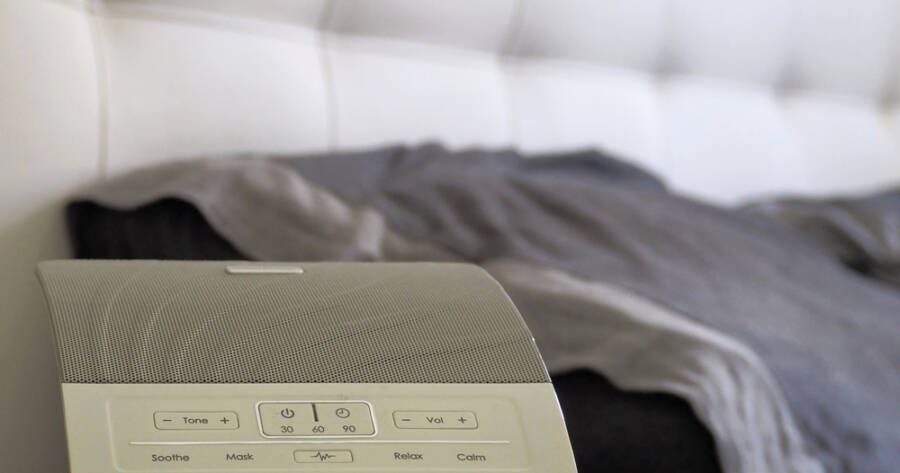Getting quality sleep can be challenging when noise, stress, or racing thoughts interrupt the body’s natural rhythm. For many people, sleep sound machines offer a simple way to create a calmer nighttime environment. By using steady, soothing sounds to mask disruptions, sound devices help promote relaxation and sleep consistency. Understanding how sound machines work (and what science reveals about their effects) can help determine whether they support more restful nights.
How Sound Machines Work
Sleep sound machines, also known as white noise machines, produce soothing background sounds. Common options include white noise, pink noise, ocean waves, rainfall, or soft fan sounds. The idea is to create a consistent audio backdrop that blocks out sudden noises—like traffic, barking dogs, or voices—that can wake you up or keep you from falling asleep.
White noise is a steady mix of all sound frequencies the human ear can hear, played at the same intensity. Pink noise is similar but softer and more balanced, often preferred for sleep. These sounds help create a kind of audio “blanket” that masks sudden changes in the environment, making the sleep setting feel more stable and calm.
The Brain’s Response to Noise
Our brains stay partially alert even during sleep, especially during lighter sleep stages. Sudden or sharp noises can trigger brief awakenings, even if we don’t fully wake up. Over time, these small interruptions can lead to lower sleep quality and morning fatigue.
Sleep sound machines help reduce this problem by smoothing out the environment. Instead of waking to a sudden door slam or loud car horn, your brain remains less reactive because the background noise softens the contrast. This effect is especially helpful for light sleepers or people living in noisy areas.
Research has shown that white noise can improve sleep onset time—how quickly you fall asleep—and sleep continuity. Some studies have found that hospitalized patients or city dwellers sleep more soundly with white noise. However, results can vary, and not everyone responds the same way to sound during sleep.
Benefits Beyond Falling Asleep
Sleep sound machines may also support better sleep quality through psychological relaxation. Soothing sounds can lower stress and anxiety, helping you wind down before bed. Rainfall or ocean waves, for example, can signal safety and calm to the brain, creating the right mental conditions for rest.
For some, using a sleep sound machine becomes part of a bedtime routine. This repetition tells the brain it’s time to sleep, reinforcing healthy sleep habits over time. For shift workers, frequent travelers, or those with irregular sleep schedules, sound machines may also help regulate the body’s internal clock by creating a consistent sleep cue.
What to Consider When Choosing a Machine
There are many types of sleep sound machines available, each with different features. Some offer a wide range of sound options, while others stick to a few basic choices. Many are portable, making them useful for travel or staying in hotels. Others come with timers or night lights for added flexibility.
When choosing a sound, personal comfort matters most. Some people sleep better with nature sounds, while others prefer a fan or simple white noise. It’s important to test different options and see what works for your specific needs. The volume should be loud enough to mask outside noise, but not so loud that it becomes distracting.
It’s also a good idea to avoid machines that play sounds on a short loop, as repetition can become noticeable and wake you up. Look for models with long tracks or smooth transitions between loops to keep the sound steady and natural.
What the Science Still Can’t Confirm
While many users report better sleep with sound machines, research is still ongoing. Scientists are exploring how different types of noise—white, pink, or even brown noise—affect brain activity during different sleep stages. Early results suggest that certain sounds might improve deep sleep or memory consolidation, but more studies are needed.
Also, while sound machines may help most users, they aren’t a cure for all sleep problems. Conditions like insomnia, sleep apnea, or restless leg syndrome often need medical support or lifestyle changes. In these cases, sound machines can be a helpful tool, but they should be used alongside other strategies.
A Calmer Night Begins with a Calm Mind
Sleep sound machines offer a practical and accessible way to improve the sleep environment by reducing the impact of disruptive noise and encouraging relaxation. Through consistent background sounds, they help the brain remain calm and less reactive to sudden changes, supporting better sleep onset and continuity. For light sleepers or those in noisy surroundings, this stability can make a noticeable difference in overall sleep quality.
While research continues to explore how different sound types influence the brain during sleep, sound machines remain a low-risk option for improving rest. They work best when paired with healthy sleep habits and consistent routines. For many individuals, incorporating a sleep sound machine can be a simple step toward calmer nights, improved recovery, and better daily energy.
